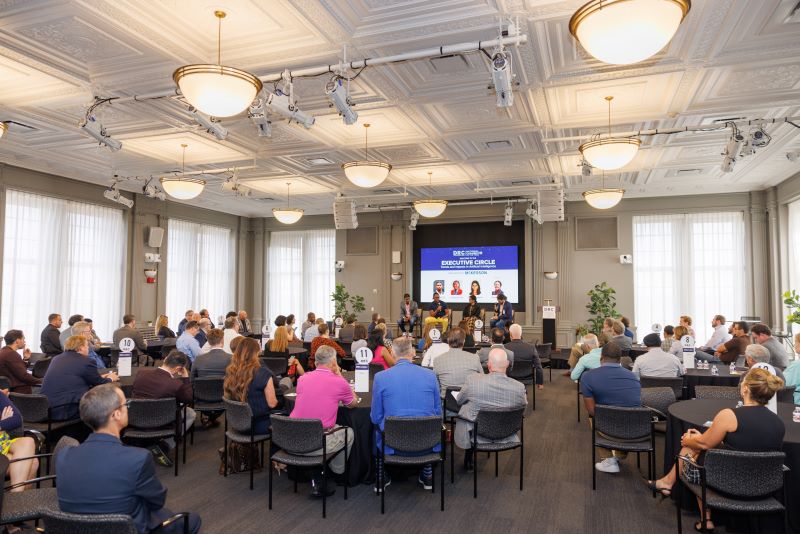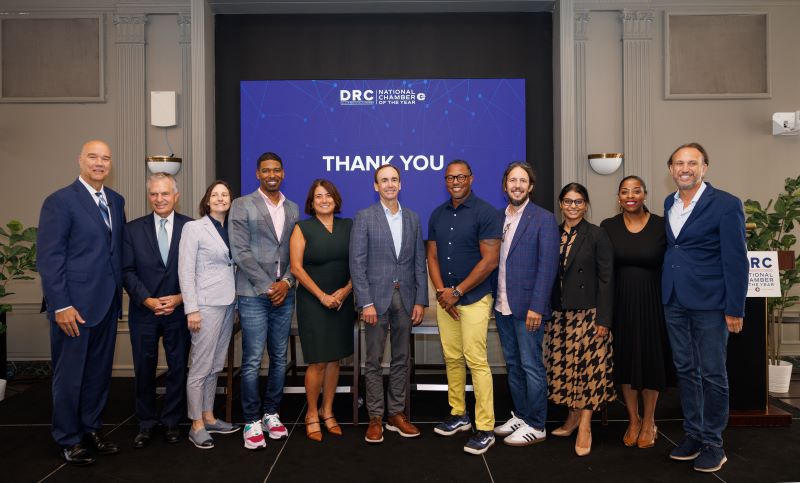By Catie George, Manager, Communications and Storytelling
In response to the rapid rise in accessibility to artificial intelligence (AI) tools, the Dallas Regional Chamber (DRC) convened a panel of AI experts for its Q3 Executive Circle event, presented by McKesson, on Tuesday, Aug. 22, at AT&T’s Dallas headquarters.
The conversation, which took place in front of business leaders from the Dallas Region, shed light on the impact of AI on how companies do business and shared practical insight into how companies can navigate and utilize AI.
“So much is happening in this space; it’s a broad topic,” said Nancy Avila, Chief Technology and Information Officer at McKesson and 2024 DRC Board Chair. “The adoption of ChatGPT brought to light artificial intelligence in this day and age. It took them two months to get 100,000,000 users last year… When I think about AI, speed is a critical factor… With the ability to use data to have a whole new level of interaction, how do we think about that?”

The panel featured industry experts David Williams, Assistant Vice President of Automation for AT&T Business Solutions; James Harding, AI and Machine Learning Specialist for Google North America; and Sindhu Avalokita, Vice President of Operations at Jacobs. Corbett Guest, President and Chief Strategy Officer of Imaginuity, served as the event’s moderator.
“[The AI revolution] promises to potentially be bigger than the Industrial Revolution, which is a lot to take in,” Guest said, setting the stage for the discussion. “It’s a big change our society is about to go through.”
In the past few years, the rapid rise of AI has left many companies and businesses wondering how to integrate the technology while maintaining security and privacy.
While Williams and Harding brought the perspective of companies leading the development of AI for business and personal applications, Avalokita shared the perspective of a company using AI to optimize operations. She said the employee experience is an important factor when considering adoption.
“I think that there is a lot more fear than excitement in the system. It should be vice versa. And so, I think for leaders and companies, how do you lead people alongside?” said Avalokita. “When you bring people alongside, I think that goes a long way.”
“No one can see a problem perfectly from one vantage point. We need every single person,” Williams concurred. “I want the administrative person listening to the technical discussion because there’s probably something we’re going to miss on the field… You need every single perspective.”
As Avalokita sees it, AI has the promise to improve the employee experience by taking on some of the day-to-day tasks that occupy employee time so they can spend more time in the “think tank.”
“Let’s engage employees with the high-value conversations where we need emotional intelligence, judgment, and experience. Let the AI tools do the manual stuff for us,” said Sindhu.
Williams agrees, saying AI can help employees do more enjoyable work.
“There was a little bit of fear, ‘is this going to do something to my own job?’ Well, you know what? [AT&T’s competitors] are trying to do something to your job, too. So, let’s get to it,” said Williams.”
Harding says Google, as a developer of AI technology, and many of its peers are considering access and equity in rollout.

“Our goal is to make information available and make sure that everyone has access,” said Harding. “As we release this technology, we want to make sure that it is accessible… [and] Google is trying to be very responsible.”
Avalokita cautions that the issue of AI accessibility starts with ensuring every American household has access to reliable, affordable internet. Companies are trying to address the digital divide through a variety of ways.
“Outside of AT&T, we’ve done a lot with trying to close the digital divide. There’s a lot of work to be done,” said Williams. “We try to provide great internet access, as well as computers and other technology and devices so that folks not only have access to it, but the device to use it. Then we also put workshops in those learning centers so that folks can learn how to use those devices.”
One thing is clear about AI: it is not slowing down any time soon.
“This thing is just getting started. If you think it’s moving fast now, it’s not. This is the school zone,” said Williams. “Once they get this train set on the track, it will not be an Amtrack. It’s going to be a bullet train. And so, I would encourage all of you to embrace it sooner than later because as the train starts moving faster it might be a little harder to catch on.”
This DRC Q3 Executive Circle event was presented by McKesson alongside Bridgepointe Technologies as the event sponsor and Imaginuity as the moderator sponsor.
If you are interested in becoming a member of the DRC Executive Circle, learn more on the DRC website.